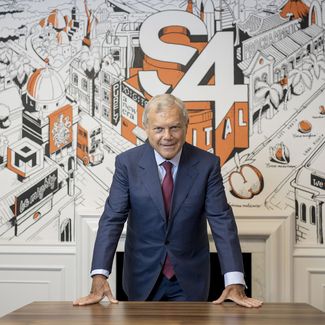
The ESG Audit: S4 Capital
Sir Martin Sorrell, founder and executive chairman of S4 Capital, on how ESG drives accountability and why he thinks holding companies are getting it wrong
The environment is a necessary focus until together we have solved the climate crisis, says Sir Martin Sorrell, the founder and executive chairman of S4 Capital. However environmental concerns need to be part of a broader ESG mosaic that should drive and motivate businesses.
Sorrell argues that ESG is a very complex issue and one that brands need to take note of, given that socially-conscious consumers are increasingly inclined to 'vote with their wallets'. This should encourage businesses to re-evaluate their working practices and purpose, including their role as employers of diverse, engaged workforces.
We're into the second week of COP 26, and the pressure is mounting for more action. Read on to find out how Sir Martin is crafting the strategy and performance of his business with ESG as one of its levers.
Environmental, social, and governance (ESG) criteria are becoming an increasingly popular way for brands and businesses to be evaluated. How much of a competitive advantage is it for your business?
ESG and DEI are both becoming crucial with clients, our people, our media partners, suppliers, government, and all stakeholders. Although, I think it’s all far simpler than modern stakeholder theory suggests. If a company focuses on long-term profitability, it all fits nicely into place - Milton Friedman’s shareholder theories modified.
We see that shareholders also shift their focus more to impact investing and ESG evaluation. It is a competitive advantage, particularly if you’re a digital business like we are and can execute in a manner fit for this digital era: fast, efficient and high quality.
DEI and ESG are critical, and client procurement is insisting we take this into account in our day to day operations.
WPP was recently quoted as saying that “Demand is off the scale” for ESG-related work. How significant is it as a potential revenue opportunity, advising clients in areas such as climate change, racial equity, privacy and responsible marketing?
It’s very important, but given the fact that the holding companies are losing share, for example market up 20 per cent in 2021 and holding companies only forecasting up 10 per cent, it can’t be critical from their point of view.
Clients and our people are insisting we focus on it.
We’ve been creating ESG-related work for our clients for many years already, as it’s part of their total communication and marketing strategy.
It is work we love to do, helping clients bring their sustainability transformation to market. We also like to focus on the positive impact companies that might not yet have significant global presence and see how we can help them achieve that.
As a holding group what is your stance on ESG for your agencies, your clients and your shareholders? And does that preclude you from working with certain businesses?
We aren’t a holdco. We’re unitary, one brand - Media.Monks. That way clients and people can have access to the most value.
We’re committed to net zero by 2024, well ahead of anybody in our industry.
Also committed to become B Corp certified, we’ve signed the Global Climate Pledge and the European Green Deal, and we’re committed to contribute to sustainability goals by integrating them in our ESG strategy. All with longer-term objectives.
Would you say 'S’ has been the focal point for communications and digital businesses - especially because during the pandemic it was the ‘S’ that was pushed into the spotlight by focussing on a host of social issues such as gender equality, human rights and labour rights?
Don’t think I agree - it’s environmental, social and governance including diversity, equity and inclusion. All of the above.
You can develop strong connections through the other five, not just social. And social performance without being embedded in the roots of an organisation can be mistaken for greenwashing. The combination of the E and S and G build a foundation on which organisations can be held accountable. That’s what matters. Environment is a necessary focus until we together have solved the climate crisis.
We have translated this to our strategic ESG pillar called Zero Impact Workspaces. We look at how we’re operating in a climate neutral way, with our people, offices and travel, since we’ve committed to achieve net zero greenhouse gas emissions by 2024, in response to the World Economic Forum 2020.
We’re also looking into the production of any of our digital assets, to see how we can reduce its footprint, captured in our Sustainable Work strategy. This is an internal ambition that needs governance, the G. Clear governance and policies guide the Media.Monks to co-create a better future. It shows we care internally, something we know is important for talent to want to work with us as it is to our investors.






